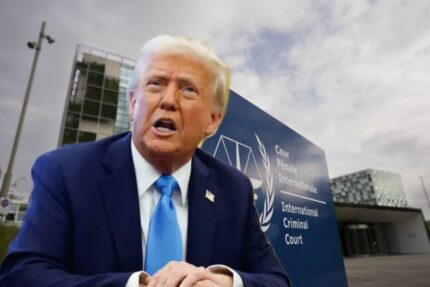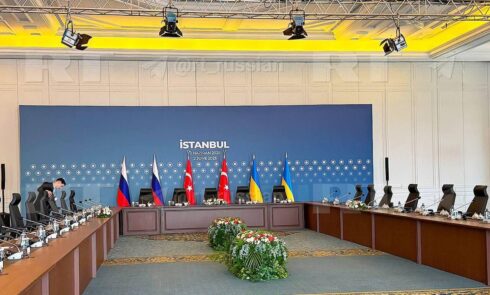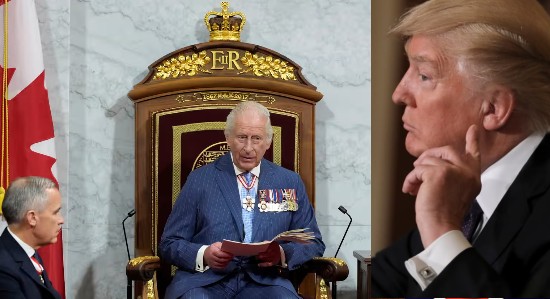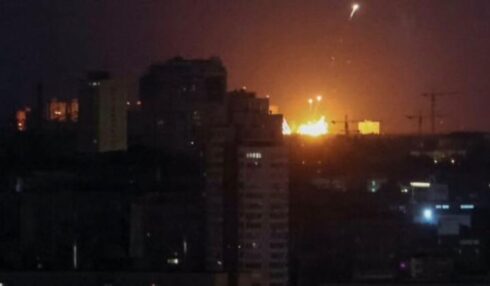U.S. President Donald Trump has signed an executive order sanctioning the International Criminal Court (ICC), calling it an “illegitimate” institution that unfairly targets the United States and Israel. The move follows the court’s recent arrest warrant against Israeli Prime Minister Benjamin Netanyahu for alleged war crimes in Gaza, a charge that Israel strongly denies.
The executive order imposes financial and visa restrictions on individuals and their families who assist in ICC investigations of American citizens or U.S. allies, particularly Israel. The Netherlands, which hosts the court, swiftly condemned Trump’s order. Dutch Foreign Minister Caspar Veldkamp stated on X (formerly Twitter) that “the court’s work is essential in the fight against impunity,” emphasizing the ICC’s role in holding perpetrators of international crimes accountable.
White House Justifies ICC Sanctions as a National Security Measure
A White House memo released alongside the executive order accused the ICC of creating a “shameful moral equivalency” between Israel and Hamas by issuing warrants for both Netanyahu and a Hamas commander simultaneously. The administration argued that this decision undermined Israel’s right to self-defense while ignoring threats posed by Iran and militant groups.
Trump’s order stated that the ICC’s actions “set a dangerous precedent” that could lead to the harassment, abuse, or even arrest of Americans. The U.S. has never been a member of the ICC and has long rejected its jurisdiction over American officials. During his first term, Trump had previously imposed sanctions on ICC officials investigating alleged U.S. war crimes in Afghanistan, though these were later lifted by President Joe Biden’s administration.
Trump Proposes U.S. Control Over Gaza Amid Israeli Support
Trump’s executive order came as he unveiled a controversial plan for Gaza, proposing that the United States “take over” the territory after the conclusion of the ongoing conflict. Speaking at a joint press conference with Netanyahu, Trump suggested turning Gaza into the “Riviera of the Middle East” by resettling Palestinians elsewhere, though he assured that no American troops would be deployed.
The proposal was met with international condemnation, with Arab leaders and the United Nations rejecting it as an unrealistic and destabilizing move. White House press secretary Karoline Leavitt later clarified that any displacement of Gaza’s residents would be temporary, while U.S. Secretary of State Marco Rubio described it as an “interim” measure to facilitate reconstruction. Meanwhile, Netanyahu praised the plan as “remarkable” and instructed the Israeli military to prepare for a “voluntary departure” of Gaza’s residents via land, sea, and air.
Netanyahu’s U.S. Visit and Trump’s Symbolic Gift
Netanyahu’s visit to Washington coincided with Trump’s signing of the executive order, highlighting the deepening ties between the two leaders. The Israeli prime minister met with lawmakers from both the Republican and Democratic parties, reinforcing bipartisan support for Israel in the U.S. Congress.
During his visit, Netanyahu presented Trump with a golden pager, a symbolic gift referencing Israel’s military operation against Hezbollah in September last year. The operation, which involved booby-trapped communication devices, resulted in dozens of casualties and significant injuries in Lebanon. The gift was seen as a gesture of appreciation for Trump’s unwavering support of Israel’s security policies.
Trump’s latest actions further cement his stance against international legal bodies that challenge U.S. and Israeli policies, setting the stage for potential diplomatic tensions with European allies and international institution
What is the ICC and What Does It Do?
The International Criminal Court (ICC), headquartered in The Hague, Netherlands, was established in 2002 to prosecute individuals responsible for war crimes, genocide, crimes against humanity, and, more recently, crimes of aggression. The court was created following global calls for justice after the atrocities of the Yugoslav wars and the Rwandan Genocide. Unlike national courts, the ICC operates as a court of last resort, stepping in only when domestic judicial systems are either unwilling or unable to prosecute serious crimes.
The court’s jurisdiction is limited to crimes committed after July 1, 2002, the date when the Rome Statute—the treaty that established the ICC—came into force. To date, 124 countries have ratified the Rome Statute, legally binding themselves to the court’s authority, while 34 additional nations have signed but not yet ratified it. However, some major global powers, including the United States and Israel, have chosen not to join the ICC, raising questions about the court’s ability to enforce justice universally.
Notable Cases and Controversies Surrounding the ICC
Since its inception, the ICC has handled numerous high-profile cases, with its first-ever conviction occurring in March 2012. The court found Thomas Lubanga, a militia leader from the Democratic Republic of Congo, guilty of recruiting child soldiers and sentenced him to 14 years in prison. Another significant case involved former Ivory Coast President Laurent Gbagbo, who faced charges of murder, rape, and persecution but was ultimately acquitted. The court has also pursued Uganda’s rebel leader Joseph Kony and Sudan’s ex-president Omar al-Bashir, both accused of war crimes and crimes against humanity.
Despite its efforts, the ICC has faced criticism, particularly from African nations, over allegations of bias. Critics argue that the court disproportionately targets African leaders, although ICC officials counter that many cases are self-referred by affected nations or brought forward by the United Nations. More recently, in 2023, the ICC issued an arrest warrant for Russian President Vladimir Putin, accusing him of war crimes related to the unlawful deportation of Ukrainian children to Russia. This action has reignited debates about the court’s jurisdiction and political influence, particularly as powerful nations like the U.S. continue to remain outside its membership while selectively cooperating in certain cases














